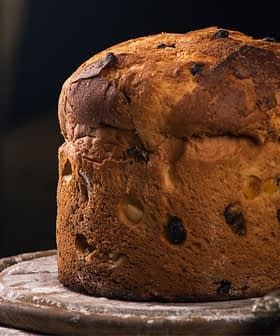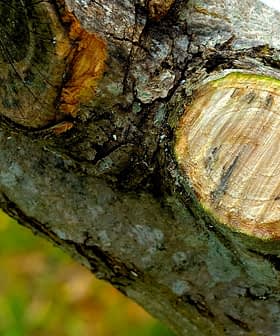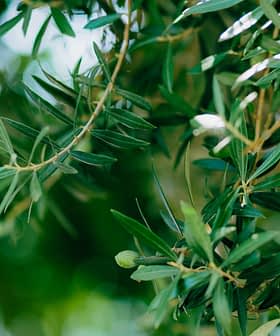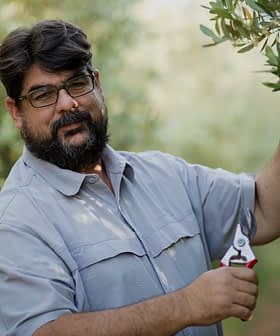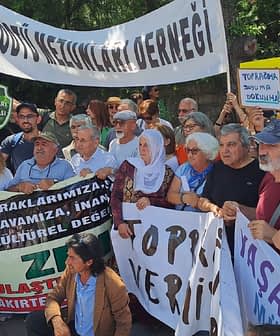Sicilian and Sardinian Producers Attribute Award-Winning Quality to Innovation, Sustainability
Producers on Sicily and Sardinia overcame drought and macroeconomic challenges to craft some of this year's best extra virgin olive oils.
 Harvest at Mandranova.
Harvest at Mandranova. Producers from Sardinia and Sicily celebrated international success at the 2023 NYIOOC World Olive Oil Competition despite a decrease in production volumes due to drought. Producers invested in technological advancements and sustainable practices to maintain high-quality standards, with Italy receiving 174 awards out of 224 entries at the competition.
After a season marked by drought and macroeconomic difficulties, producers from Italy’s two largest islands, Sardinia and Sicily, celebrated their international success at the 2023 NYIOOC World Olive Oil Competition.
The drought that affected all of Italy did not spare the two regions, which, due to the effects of an ‘off-year’ (the phase of lower production in the olive trees’ natural alternate bearing cycle) suffered a slight decrease in production volumes.
Especially at the end of these very complicated years marked by the difficulties due to the pandemic, the war and weather adversities, (winning at the NYIOOC) is an even greater satisfaction.
Yet the insular farmers maintained high-quality standards, recognized by the panel of judges at the world’s largest olive oil quality competition.
A continuously evolving approach involving every detail of the production process, from technological features at the farm level to wide-reaching environmental aspects, has helped these producers to make their way to the global stage and contribute to the overall success of their country – Italy obtained 174 awards from 224 entries, which is one of the highest success rates at the 2023 NYIOOC.
See Also:The best extra virgin olive oils from ItalyCredit for the five awards delivered to Sardinia goes to Pasquale Manca and his San Giuliano extra virgin olive oil brands, Fruttato and L’Originale, which obtained two Gold Awards, and Monocultivar Bosana, Organic and Primér, which each received a Silver Award.
“We are glad to receive these recognitions, also because they pay off the investments we recently made in the mill,” he told Olive Oil Times. “In particular, at the end of the last harvest, in November, we installed an ultrasound system on two of our four production lines.”
“Despite the delay, due to the global problems related to the supplying of raw materials, we set it up in time to test it on a small part of the fruits. We had some interesting feedback, which makes us think that the contribution of this technology to next year’s yield can be significant,” he added.
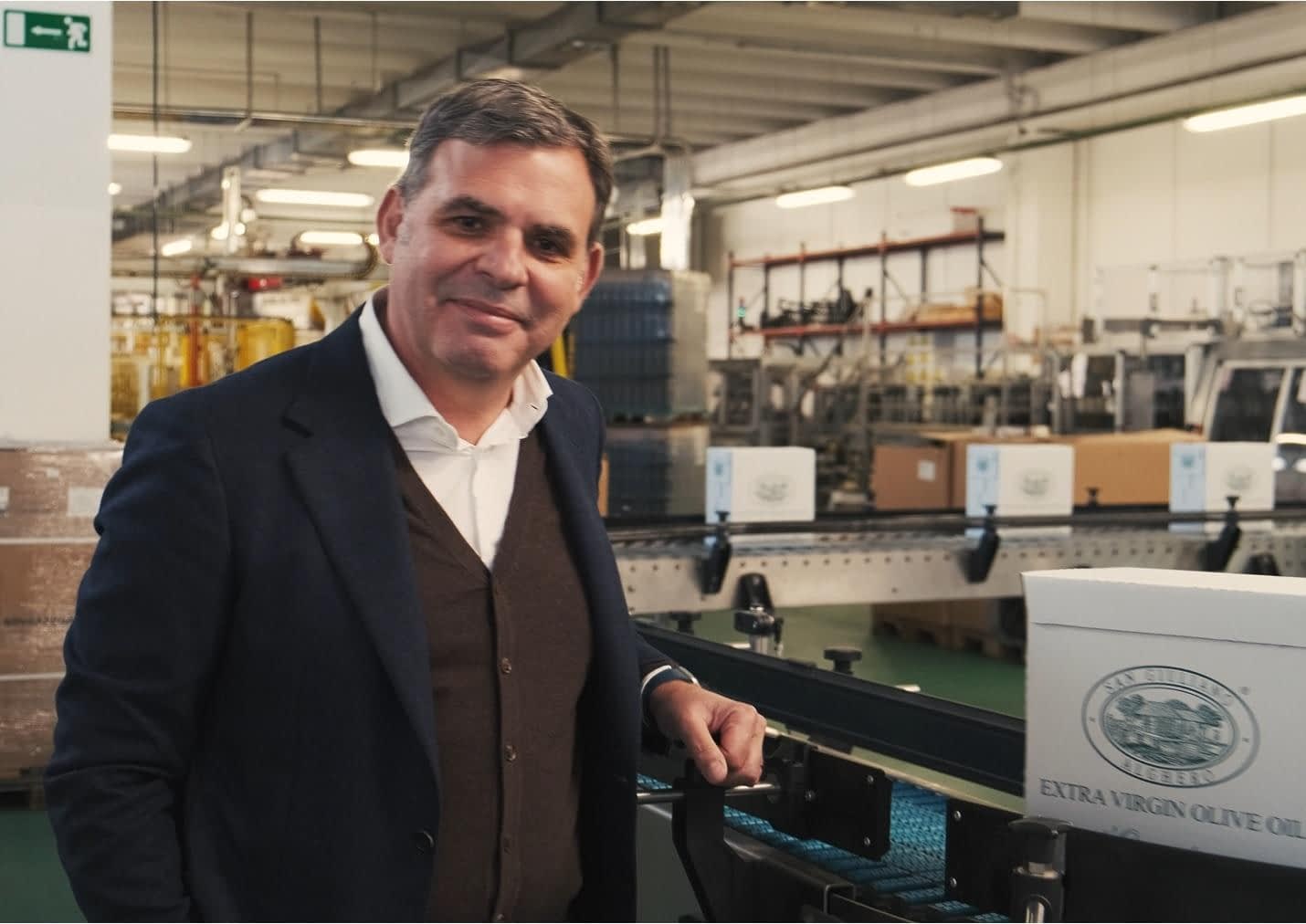
Pasquale Manca
Investments are also being made in new lands, particularly those once used for pasture, which are now discarded and uncultivated.
“Since sheep grazed on these plots for centuries, they are rich in nitrogen,” Manca said. “We are acquiring new properties of this kind, where we will plant new olive trees in the coming years.”
Now, Domenico Manca manages about 150,000 trees and plans to double this total in three or four years and double it again in 10 years, with the goal to reach 1,000 hectares.
“We are constantly expanding and evolving, and to do so, we spend time experimenting, both in the mill and in the groves, also collaborating with researchers,” Manca said.
Located in northwestern Sardinia, in the vast plain of Nurra, his groves are arranged according to different planting patterns, from traditional to super-high-density, including the mainly native Sardinian varieties of Bosana, Nera di Oliena and Semidana.
“We also have Coratina from Puglia as well as the Catalan varieties, Arbosana and Arbequina, which we value not only from a business point of view but also because there is a particular connection between their birthplace and ours, Alghero, since we are a linguistic minority that speaks ancient Catalan,” Manca said.
Meanwhile, producers across Italy’s other major Mediterranean island celebrated another year of success at the World Competition.
The producers behind Mandranova, in the province of Agrigento, celebrated a Gold Award for a Nocellara del Belice monovarietal awarded yearly at the NYIOOC.
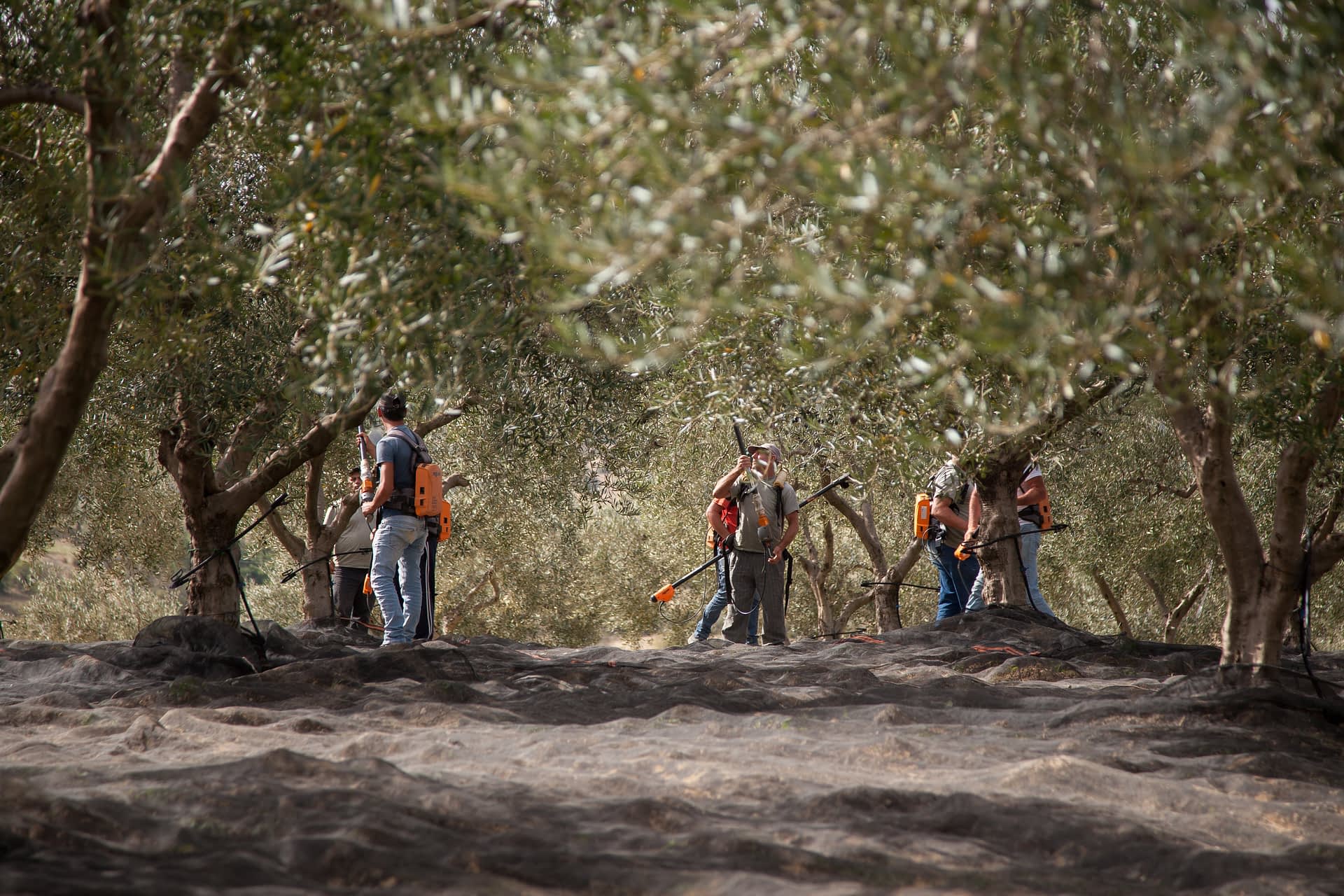
Harvesting olives traditionally at Mandranova’s olive groves
“Receiving recognition at the NYIOOC every year is very important to us because it allows us to guarantee the consumer our constant commitment to high quality,” said Silvia Di Vincenzo, who manages the company with her husband, Giuseppe and son Gabriele.
“We have been participating since the beginning, and this also gave us the opportunity to compare ourselves with the other producers over time,” she added.
Close to the southwestern coast, in Palma di Montechiaro, about 10,000 Nocellara, Cerasuola, Biancolilla and Giarraffa trees lie at the heart of the estate, including a hospitality resort.
“We have been olive growers for five generations,” Di Vincenzo said. “Once, the property included a vineyard, but we decided to focus exclusively on olive production, which is organically managed, following high standards of sustainability.”
According to the same principles of quality and environmental protection, they dedicate themselves to the cultivation of almonds – the estate contains a grove of 15,000 trees.
“The company is in continuous evolution as we try to improve every stage of the production process,” she said. “For example, in the beginning, we pruned the trees according to the free vase form; now, we do it according to the polyconic vase method. Before, we collected the fruits only with facilitators; now we perform three different types of harvests to speed up the operations and pick still green olives.”
The fruits are crushed in the state-of-the-art company mill that uses a two-phase water-saving system. It boasts a new technology that reduces the processing time increasing phenols extraction and a chiller that refrigerates the equipment.
“We try to make our products in the best possible way, not so much for business, but rather because we are deeply in love with extra virgin olive oil, and this indeed is what inspires us to keep the quality high,” Di Vincenzo said.
Situated just to the west of Mandranova’s groves is the village of Villafranca Sicula, home to the Loco Galbasa organic farm, which won a Silver Award with its first NYIOOC entry for a monovarietal of Biancolilla.
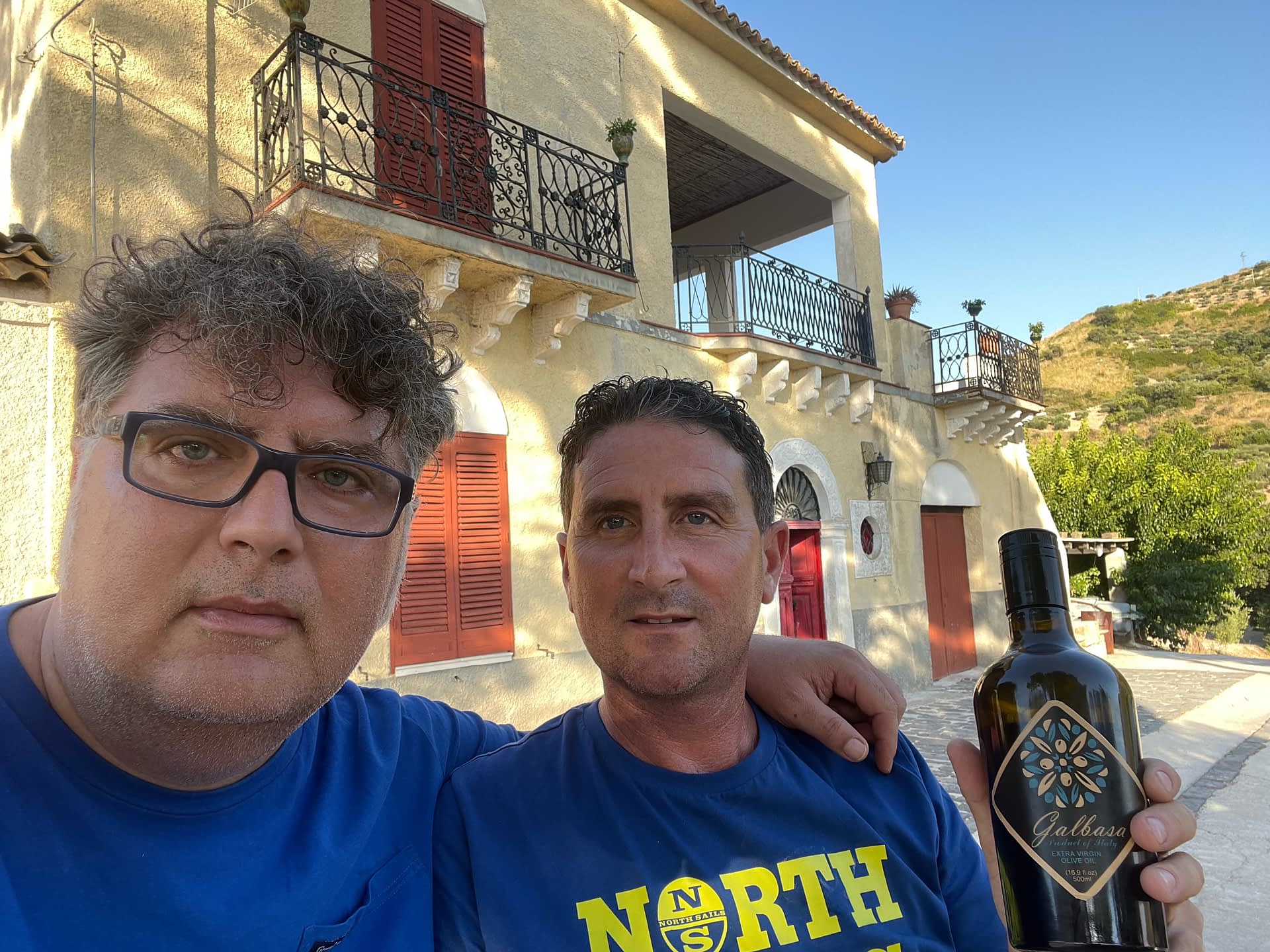
Loco Galbasa co-owners Marco Gagliano and Sandro Domenico Musso
“This recognition shows us that our company had a great start and is moving in the right direction,” said co-owner Marco Gagliano. “In fact, the farm was established in 1963 and was managed by our uncle.”
“When my cousin and I took over last year, we conceived the brand design and focused on high quality,” he added. “Being the first time that we participate and after such a short time since the start of our project, this award gives us even greater satisfaction.”
The 20-hectare farm is located in a valley where 4,800 olive trees thrive overlooking the sea – centuries-old Biancolilla trees, which represent the vast majority of the orchard, are flanked by the other local varieties, Cerasuola and Nocellara del Belice.
“On clear days, we can spot the island of Pantelleria,” said co-owner Sandro Domenico Musso. “Here, the olive groves have developed very well, thanks to the dry climate that prevents several diseases.”
The estate includes a farmhouse dating back to 1860, when many olive trees were planted. Among these are small percentages of neglected varieties such as Passulunara, Giarraffa and Bottone di Gallo.
“They have a high historical and botanical value, representing a true heritage that we safeguard carefully. Each plant is like a child to us, as we know each of them,” Musso said. “We worked hard to improve the company, always with the care of the environment and its biodiversity at heart.”
To maintain the humidity and improve soil fertility, they adopt sustainable practices, including mulching and green manure. Furthermore, they recently introduced some apiaries in the grove to produce organic honey and especially for their important role in the ecosystem.
“Again, for reasons of sustainability, we rely on the latest generation mill that is within walking distance from the farm,” Musso said. “Since it is a two-phase machinery, it does not require water, and we can save much of this precious resource also thanks to our ancient olive trees that do not need to be irrigated.”
In the south-eastern corner of the island, in the village of Buccheri, Siracura, the producers behind Agrestis celebrated yet another Gold Award for their monovarietal Fiore D’Oro, which is a Monti Iblei Protected Designation of Origin-certified oil.
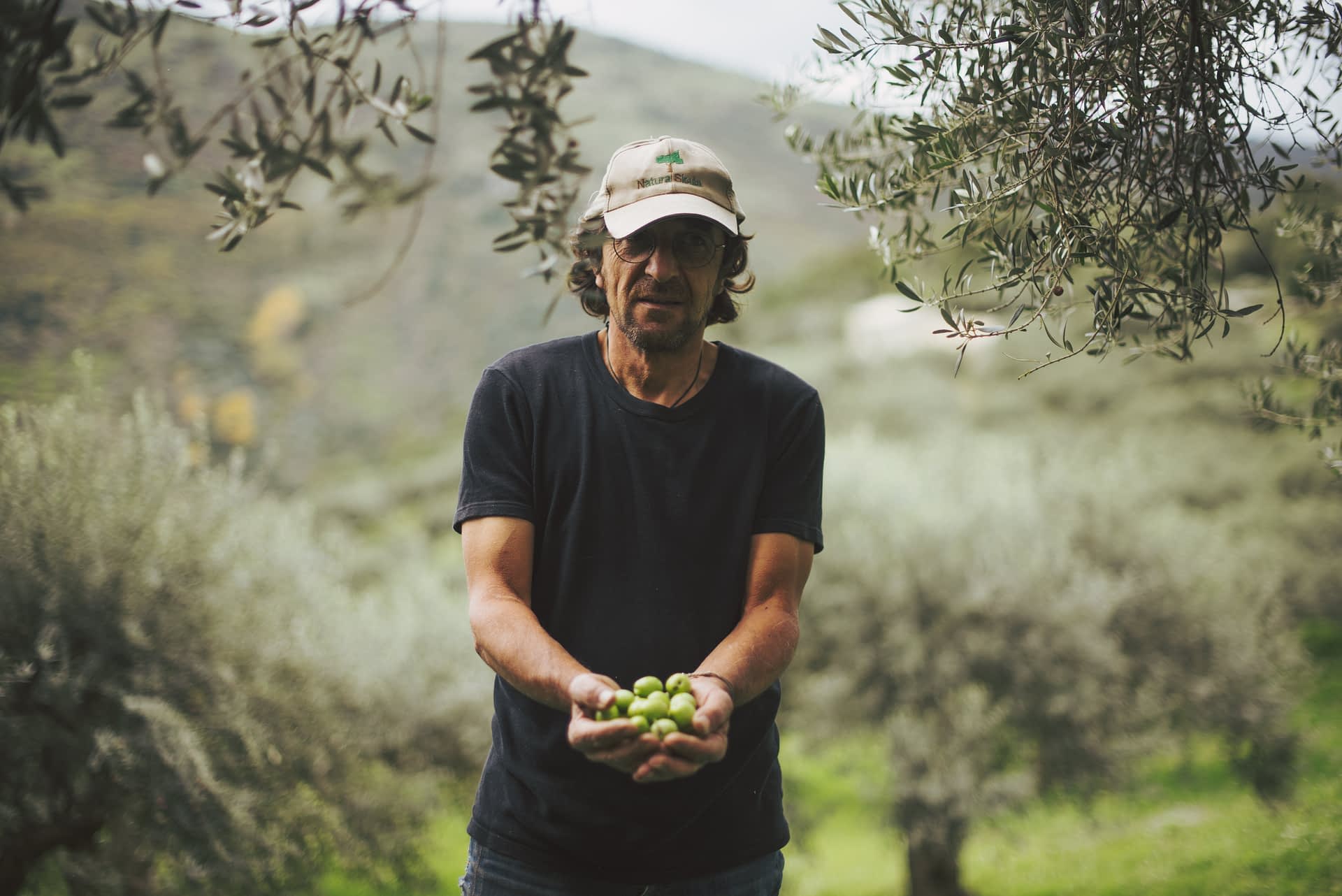
Lorenzo Nicotra
“Every time, it is a joy to receive an award in such a prestigious competition, which helps us olive growers to be valued,” said Pietro Nicotra. “Especially at the end of these very complicated years marked by the difficulties due to the pandemic, the war and weather adversities, it is an even greater satisfaction to be able to achieve this result.”
Along with his father, Lorenzo Nicotra, and associate, Salvatore Paparone, he manages a 50-hectare orchard with 10,000 olive trees. Ancient Tonda Iblea trees, with some rows of Biancolilla and Nocellara, flourish on the slopes of Mount Lauro, an extinct volcano. They are partly scattered on steep terraces at about 600 to 700 meters above sea level.
“Altitude and soil structure are not easy to manage and require much more work,” Nicotra said. “However, there are also positive aspects, like a strong temperature variation between day and night and an effective drainage of rainwater, which have beneficial effects for the plants and fruits and help us to improve our product’s organoleptic profiles.”
“The trees are not irrigated, and this allows us to preserve this very important resource, as sustainability is at the core of our entrepreneurial vision,” he added.
Arranged according to an extensive planting pattern and located up to 10 meters away from each other, some of the trees are almost 1,000 years old.
For a couple of years now, the company has been carrying out a project for their adoption, through which the participants establish a special connection with the adopted trees, visiting the farm and receiving some of the oil they produce every year.
“This project helps us to recover abandoned groves,” Nicotra said. “The philosophy of the company since its foundation 20 years ago is, rather than creating new plantations, to safeguard the ancient ones.”
“We indeed started by recovering abandoned groves, also with a view to save them from the risk of ever more frequent wildfires, therefore with the aim of preserving the important heritage represented by these majestic, ancient olive trees,” he concluded.
Share this article


